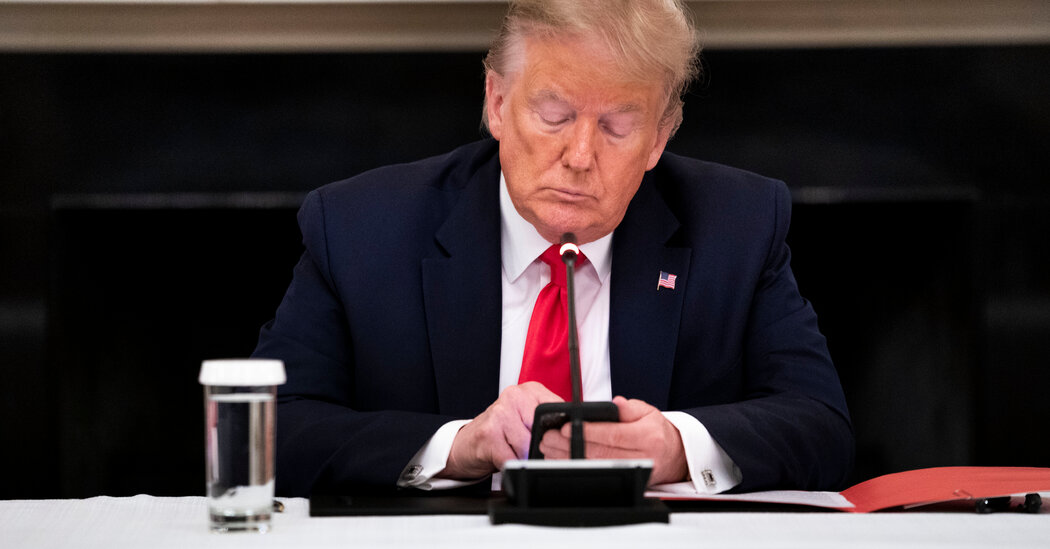President Trump has made his war on Big Tech a central piece of his re-election campaign. For months, he has accused Facebook and Twitter of attempting to rig the election by silencing criticism about his rival, former Vice President Joseph R. Biden Jr., and called for new regulations to rein in Silicon Valley giants.
But Mr. Trump is far from muzzled online. In fact, in recent weeks, he has widened his social media engagement lead over Mr. Biden.
In the past 30 days, Mr. Trump’s official Facebook page has gotten 130 million reactions, shares and comments, compared with 18 million for Mr. Biden’s page, according to data from CrowdTangle, a Facebook-owned data platform. That is significantly larger than the engagement gap for the preceding 30-day period, when Mr. Trump got 86 million interactions to Mr. Biden’s 10 million.
Mr. Trump trounced Mr. Biden on Instagram, too, getting 60 million likes and comments on his posts in the past 30 days, nearly twice as many as Mr. Biden’s 34 million. In the preceding 30-day period, Mr. Trump got 39 million likes and comments, while Mr. Biden got 13 million.
Mr. Trump also far outpaced Mr. Biden on YouTube, getting 207 million views on his videos in the last 30 days to Mr. Biden’s 29 million, according to SocialBlade, a data firm that tracks video performance. (SocialBlade’s data, which includes views on YouTube ads as well as unpaid videos, is slightly different than CrowdTangle’s Facebook and Instagram engagement data, which counts mostly engagement on unpaid posts.)
Social media performance is not a proxy for electoral success, of course, and Mr. Trump’s campaign would probably prefer to be leading in swing-state polls than on Facebook and YouTube. Engagement data also does not capture how many people view or click on posts, only how strong a reaction they elicit. And Facebook has argued that data about “reach” — the number of people who actually see a given post in their feeds — shows a more accurate picture of what is popular on the platform. (It does not, however, make this data publicly available.)
But it is useful to look at the president’s claims of partisan bias by tech companies in light of his sky-high engagement on those same companies’ platforms, because it hints at the nature of his complaints. His arguments are not the pleas of an underdog being silenced, but the threats of a star who wants to be allowed to keep his megaphone.
Some of the president’s posts in recent weeks have included misinformation about mail-in voting, dubious claims about Covid-19 and false and unproven allegations of corruption against Mr. Biden. Several of his posts have been taken down or had fact-checking labels applied to them. But these measures do not appear to have dented his account’s overall engagement.
The president’s strongest week on Facebook and Instagram came during his early October hospitalization for Covid-19, when well-wishers flooded his pages with supportive likes and comments. On YouTube, his best day came this week, when he took out a number of ads about accusations against Mr. Biden’s son Hunter, published by The New York Post. (The New York Times has not independently confirmed The Post’s reporting, and Mr. Biden’s campaign has dismissed the allegations as “Russian disinformation.”) Those ads performed well for Mr. Trump, and his channel got nearly 22 million views on Tuesday alone.
One bright spot for Mr. Biden is Twitter, where the former vice president has been performing well of late. According to Axios, which cited data from the media intelligence company Conviva, Mr. Biden has overtaken Mr. Trump in recent days when it comes to the average number of retweets and replies on his posts. (Per-post averages may be one social media contest that the president’s nonstop tweeting habit does not help him win.)
Another platform where Mr. Biden has beaten Mr. Trump? TV. His town hall on ABC last week got a bigger audience than Mr. Trump’s head-to-head NBC town hall, according to Nielsen.
And given Mr. Biden’s significantly smaller social media audience, he is punching above his weight. His Facebook page’s “interaction rate” — a measure of engagement that takes into account how many followers an account has — is currently more than twice as high as Mr. Trump’s.
Source: Read Full Article
